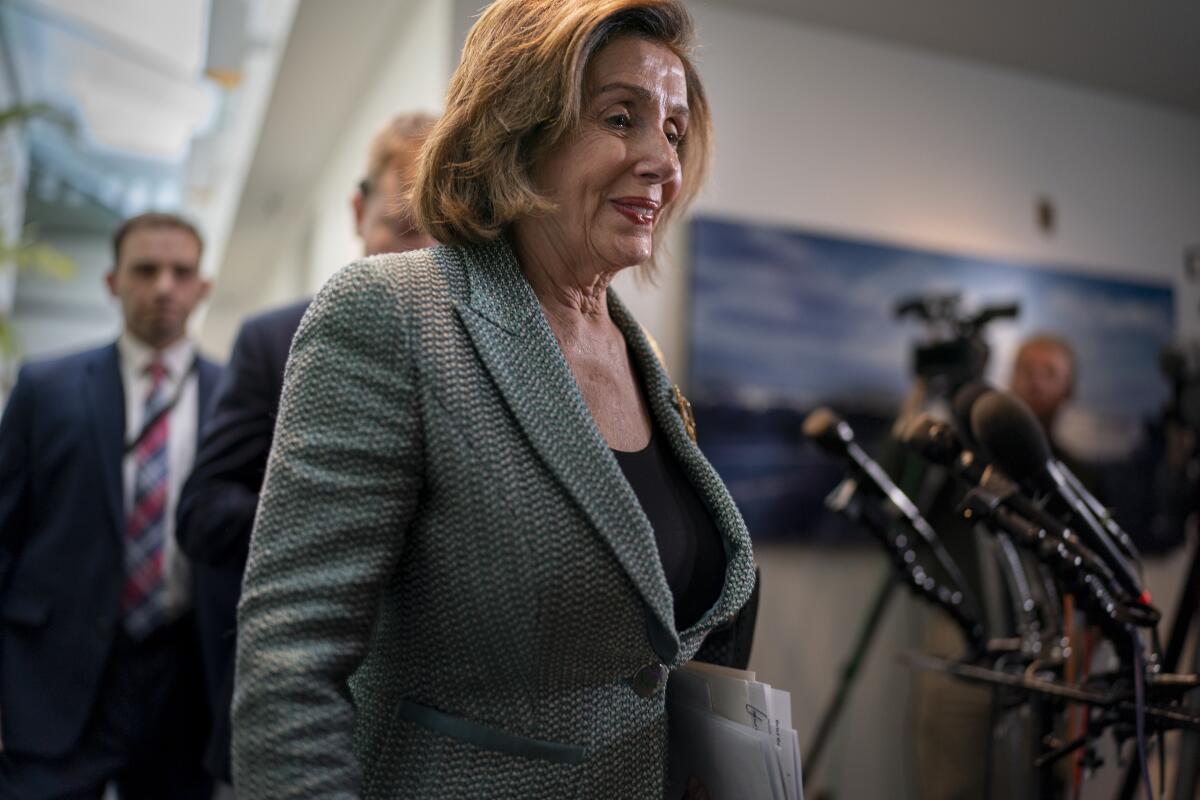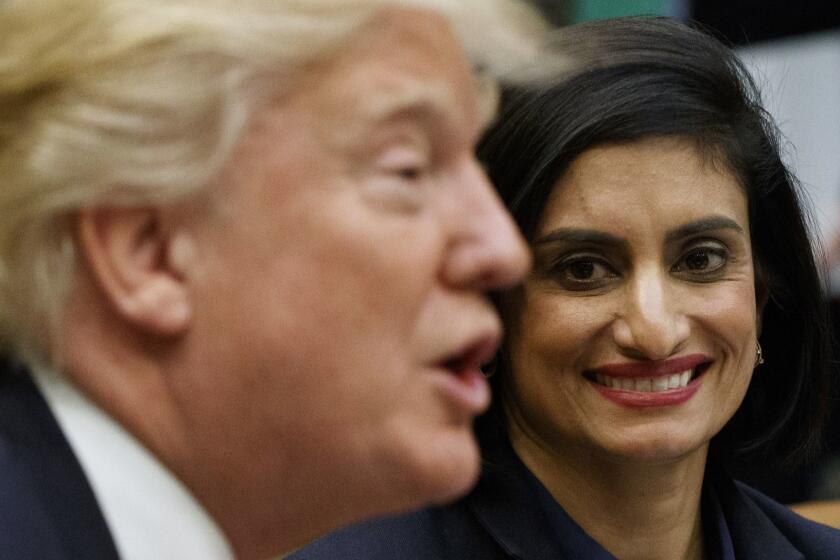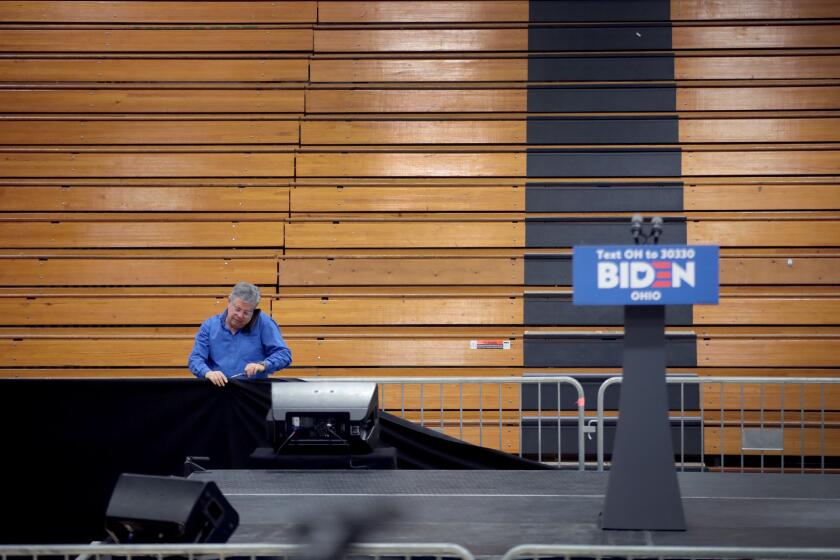House Democrats and White House reach deal on coronavirus stimulus package

- Share via
WASHINGTON — House Speaker Nancy Pelosi and Treasury Secretary Steven T. Mnuchin reached a deal Friday on an economic stimulus package to address the coronavirus, providing paid sick leave for workers and pumping billions of dollars to states for food programs and unemployment benefits.
Pelosi announced the agreement Friday evening, not long after President Trump trashed it at an afternoon news conference.
“We are proud to have reached an agreement with the administration to resolve outstanding challenges, and now will soon pass the Families First Coronavirus Response Act,” she wrote in a letter to colleagues late Friday.
A few hours later, Trump tweeted his own endorsement. “I encourage all Republicans and Democrats to come together and VOTE YES!” Trump wrote.
The deal hit a last-minute hitch when some Republicans reportedly voiced concerns about some elements.
But Trump’s support will probably sway many House Republicans, and more important, the GOP-controlled Senate, which is expected to consider the bill next week. House Democrats were moving toward approving the measure later Friday.
Lawmakers hope the package will quell financial markets. But it is also designed to meet the rapidly changing social needs of the country.
With schools closed in many states, children who rely on school lunches will need to be fed with funding from the legislation; with sports arenas and other institutions closing, workers may crowd unemployment lines.
It would also dramatically expand access to free coronavirus testing. Insurance companies would be required to cover it without a copay for consumers and a federal national disaster program would reimburse the cost for people without insurance.
Facing mounting pleas from California and other states, the Trump administration moved Friday to allow states to use Medicaid more freely to respond to the coronavirus crisis and expand access to medical services.
“The three most important parts of this bill are testing, testing, testing. This legislation facilitates free coronavirus testing for everyone who needs a test, including the uninsured,” Pelosi said Friday in an address delivered from the speaker’s balcony hallway. It is a location the speaker reserves for high-profile announcements, complete with hanging American flags, conveying a sense of seriousness.
Pelosi (D-San Francisco) negotiated with Mnuchin, a member of Trump’s Cabinet, in two dozen phone calls over the last two days, according to a Pelosi spokesman. They spoke twice during Trump’s news conference alone.
Negotiations got tense Friday. Trump’s critical comments at his afternoon news conference nearly scuttled hope for GOP support.
“We just don’t think the Democrats are giving enough,” Trump said in the White House Rose Garden. “We thought we had something, but all [of a] sudden they didn’t agree to certain things they had agreed to.”
But he left the door open slightly, saying “we could have something.” Trump didn’t specify what parts of the bill concerned him.
Democrats warned they would not wait around much longer for a bipartisan agreement.
“If we reach agreement, we’ll vote on it,” House Majority Leader Steny H. Hoyer (D-Md.) told his fellow Democrats. “If not, we will vote today on our bill, which incorporates nearly all of what the administration and Republicans have requested.”
Republicans in Congress were looking to the White House before deciding whether to support it. GOP lawmakers have often been skittish about voting on legislation before Trump has publicly weighed in.
Because of the coronavirus, Joe Biden, Bernie Sanders, even President Trump, have stopped rallies. Louisiana postponed its presidential primary.
In 2018, the White House indicated that Trump would support a bill to avert a government shutdown, but Trump reversed his position after the Senate had voted, leading to the longest partial shutdown in American history.
The bill would mark the second coronavirus response package approved by Congress and is unlikely to be the last.
“We’ve resolved most of our differences, and those we haven’t, we’ll continue the conversation because there will obviously be other bills,” Pelosi said late Thursday.
The bill is expected to provide Social Security Administration funding for workers who don’t currently receive sick pay and need to stay home because they have COVID-19 or need to care for someone who does. People would be eligible to receive benefits amounting to two-thirds of their monthly earnings, up to $4,000, for up to three months.
Democrats originally proposed a permanent mandate that employers provide paid leave for all sick workers nationwide, plus the additional temporary measure to address the current need to allow sick workers to stay home.
Republicans said the ideas were too broad, long-lasting and would take too long to implement, advocating for a narrower approach. The permanent program does not appear to be in the final agreement.
A proposal from Trump to cut payroll taxes was not included, as both parties in Congress have panned it.
The deal would mark the second time Pelosi and Mnuchin have successfully negotiated a bipartisan agreement.
Pelosi and Mnuchin crafted a budget deal together last year.
During the process of crafting that bill — which raised caps on spending and lifted the federal debt ceiling — Pelosi and Mnuchin built a mutual trust and respect.
Mnuchin is a relatively apolitical member of Trump’s Cabinet with a laser-like focus on the economy.
Pelosi is a longtime legislator well practiced in crafting political deals.
Times staff writer Sarah D. Wire contributed to this report.
More to Read
Get the L.A. Times Politics newsletter
Deeply reported insights into legislation, politics and policy from Sacramento, Washington and beyond. In your inbox three times per week.
You may occasionally receive promotional content from the Los Angeles Times.













